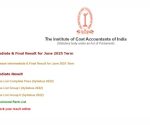The ACCA course (Association of Chartered Certified Accountants) is a globally recognized ACCA certification that helps students and professionals gain expertise in financial management, auditing, taxation, corporate law, and strategic business planning. This course equips learners with both technical accounting skills and soft skills like communication, decision-making, and professional integrity.
With a presence in over 180 countries and a network of 200,000+ members, ACCA offers global career opportunities in banking, consulting, IT, FMCG, manufacturing, and Big 4 firms. Whether you are a student or a working professional, this ACCA certification prepares you for high-demand finance roles worldwide, making it one of the most respected qualifications in accounting today.
What is ACCA Course?
The ACCA course is a professional qualification designed to develop strong foundations in accounting, finance, audit, taxation, business law, ethics, and strategic management. It is designed in a way that focuses on practical learning and global standards like IFRS. This means, once qualified, you can work in almost any country and be valued for your skills. ACCA Course also provides the flexibility to study at your own pace, making it a student-friendly program. Whether you are a student or a working professional, ACCA helps build a career that goes beyond traditional accounting.
Who Should Pursue the ACCA Course?
The ACCA course is ideal for:
- Class 10 or 12 students planning a global finance career
- Commerce and non-commerce graduates
- Working professionals in finance or accounting
- CA/CMA aspirants seeking international exposure
ACCA qualified professionals are employed across banking, consulting, IT, FMCG, manufacturing, and Big 4 firms due to their exposure to international accounting standards and business strategy.
ACCA Full Form & Governing Body
ACCA full form is Association of Chartered Certified Accountants. It is a UK-based global professional accounting body that regulates and awards the ACCA qualification. Founded in 1904, ACCA is headquartered in London, United Kingdom, and acts as the official governing body responsible for setting the syllabus, conducting examinations, enforcing ethical standards, and granting ACCA membership worldwide. The organization focuses on developing finance professionals with strong technical expertise, ethical values, leadership skills, and global business awareness.
Skills You Learn in ACCA
- Financial Reporting & Analysis: You’ll understand how to prepare and interpret financial statements in accordance with international standards. This skill is crucial for any finance-related role.
- Business Strategy & Leadership: You will be trained to think like a business leader. Strategic decision-making, risk management, and leadership skills are deeply embedded in the course.
- Corporate and Business Law: ACCA helps you gain knowledge about global business laws. This includes contracts, legal frameworks, and compliance, which are necessary for corporate governance roles.
- Audit & Assurance: You’ll learn how to conduct internal and external audits. This ensures transparency and helps organizations build trust with stakeholders.
- Professional Ethics: Ethics is a core subject in ACCA. You’ll understand the importance of integrity and transparency, helping you become a trusted finance professional.
ACCA Course Eligibility
ACCA is a course that welcomes students from diverse backgrounds. It is especially suited for students who want to build a career in finance and work internationally. The course structure supports freshers, graduates, and even working professionals. It is a great option for those looking to balance flexibility with high career growth. Students who may not qualify for CA or other national-level exams can still pursue ACCA and have a successful career.
- After Class 10: Students can register through the Foundation in Accountancy (FIA) route; no commerce background is required.
- After Class 12: Minimum 65% in Maths/Accounts and English, and 50% in other subjects to register directly for ACCA.
- Graduates: Both commerce and non-commerce graduates are eligible to apply.
- Exemptions for Graduates: Candidates may receive paper exemptions based on their academic qualifications.
- CA / CMA Candidates: Eligible for maximum exemptions, making ACCA the fastest international qualification route for them.
- Flexible Entry: ACCA allows multiple entry points, making it accessible for students and working professionals alike.
ACCA Exemptions for Indian Students:
| Qualification | Total ACCA Papers | Exams to Attempt | Exemptions Given |
| Class 12 (HSC) | 13 | 13 | 0 |
| B. Com | 13 | 9 | 4 |
| M. Com | 13 | 9 | 4 |
| CA IPCC (Both Groups) | 13 | 8 | 5 |
| CA Qualified | 13 | 4 | 9 |
These exemptions help reduce the number of exams, saving time and effort. However, they must be claimed within 10 years of completing the original qualification.
ACCA Course Duration
The time required to complete the ACCA course depends on your educational background, exemptions, and study pace. Most students in India complete ACCA within 2 to 4 years, but this can vary:
- Freshers after Class 12: 3–4 years to complete all levels.
- Commerce Graduates: 2–2.5 years, depending on exemptions.
- CA / CMA Qualified Professionals: 12–18 months due to maximum exemptions.
Exam Limits:
- Maximum 4 papers per session, up to 8 papers per year.
- Flexible exam scheduling allows students to study at their own pace.
Note: Full-time learners who study intensively and have exemptions may complete ACCA in less than 2 years.
ACCA Course Fees
The total cost of completing the ACCA course in India depends on registration, exam fees, annual subscription, study materials, and coaching. Here’s a breakup of fees to help aspirants plan better:
| Fee Component | Cost (INR) | Notes |
|---|---|---|
| ACCA Registration Fee | ₹10,000 | One-time fee to register with ACCA Global. |
| Annual Subscription Fee | ₹9,000–₹10,000 | Paid every year to maintain student membership. |
| Exam Fees (per paper) | ₹7,000–₹10,000 | Fees vary depending on paper level (Applied Knowledge/Skills/Professional). |
| Study Material / Books | ₹15,000–₹25,000 | Optional if you join coaching; includes digital and hardcopy materials. |
| Coaching / Tuition Fee | ₹50,000–₹1,50,000 | Depends on institute and mode (online, classroom, blended). |
| Ethics & Professional Skills Module | ₹3,500 | Mandatory online module for full ACCA membership. |
| Total Estimated Cost | ₹2,00,000–₹4,50,000 | Covers all mandatory components; varies with exemptions and coaching. |
How to Become an ACCA?
Becoming an ACCA member requires commitment, but the journey is flexible and rewarding. Whether you’re a school student, graduate, or a working professional, the process is streamlined to support your learning and development. You’ll need to pass the exams, gain experience, and complete an ethics module to get the final membership.
Step-by-Step Process:
- Register Online with ACCA Global: Create an account, pay the initial fee, and upload your documents to get started.
- Select a Coaching Partner: Choose an institute that suits your learning style—online, classroom, or hybrid. A good training partner can help you with mock tests, study material, and revision support.
- Check for Exemptions: Submit your previous qualification details to see if you are eligible for any exemptions. This reduces your exam load and shortens the course duration.
- Complete 13 Exams: You must pass all 13 papers, although exemptions can reduce this number. Exams are available four times a year, allowing you to plan your pace.
- Complete Practical Experience: Gain 36 months of relevant work experience in any finance-related role. This is a key requirement to apply your knowledge practically.
- Finish the Ethics and Professional Skills Module: This 20-hour module is essential to become a full member. It enhances your business communication, decision-making, and leadership skills.
- Apply for Membership: Once you complete all steps, apply to become a certified ACCA member. You will then receive the designation and join a global network of professionals.
Countries Where ACCAs Have Signing Authority
A major benefit of becoming ACCA-qualified is the global authority and acceptance it brings. While ACCAs cannot sign audit reports in India, they do hold audit and self-practice authority in several countries. This global flexibility makes it one of the most sought-after qualifications for Indian students wanting to work abroad. Here are the countries that offer Audit or Signing Rights to ACCAs:
- United Kingdom: ACCAs in the UK have full signing authority and can run their own practices.
- Canada: After meeting local criteria, ACCAs can sign audit reports and take on independent roles.
- Australia and New Zealand: Both countries recognise ACCA and offer audit practice rights through additional pathways.
- Singapore and UAE: ACCAs are fully recognised in private and public sectors, including signing capabilities.
- South Africa and Germany: These countries accept ACCA members with local registration for key finance roles.
Why Should You Pursue ACCA?
Choosing ACCA gives students a head start in global accounting and finance. It is a state-of-the-art course, highly relevant for today, where the balance between technical expertise and business thinking is minimal. ACCA, for Indian students desirous of working abroad or with MNCs, offers exceptional flexibility and opportunities. Compared to CA, ACCA is more readily available and recognized internationally.
Key Benefits:
- A Great Alternative to CA: ACCA offers international scope, updated syllabus, and better work-life balance. Unlike CA, which is focused on Indian laws, ACCA covers IFRS and global accounting standards.
- Faster Career Growth: ACCA is known for helping students reach mid-senior roles early in their careers. The soft skills training further boosts leadership potential.
- Higher Earning Potential: Recruiters know ACCA members meet international benchmarks. This enhances your market value and helps secure better salary packages.
- Global Networking: ACCA gives you access to a strong alumni network across the world. This opens up collaboration, job referrals, and mentorship opportunities.
Checkout Average Salary of ACCA in UK
What Are the Potential Job Roles After ACCA Qualification?
After earning the ACCA qualification, students can explore a wide variety of job roles in diverse industries. ACCAs are respected for their analytical thinking, ethical standards, and financial expertise. Employers across sectors, from banking to FMCG, prefer hiring ACCA professionals.
Top Job Roles:
- Financial Accountant: Responsible for preparing financial reports and ensuring compliance with standards. You will work closely with CFOs and external auditors.
- Management Accountant: Focuses on budgeting, forecasting, and strategic decision-making. This role is crucial in helping businesses reduce costs and increase profits.
- Audit Associate: Works on both internal and external audits. Your job will involve evaluating financial controls and ensuring regulatory compliance.
- Tax Consultant: Specialises in taxation laws and advises clients or companies on effective tax planning and statutory filings.
- Finance Manager: Manages the complete financial operations of a company. This includes report generation, investment planning, and cost optimisation.
- Credit Controller: Ensures that debts are paid on time, assesses creditworthiness of clients, and helps minimise financial risks.
What Are the 13 Subjects in ACCA?
The ACCA curriculum is split into three levels and includes 13 papers. These subjects are designed to build your knowledge from fundamentals to strategic expertise.
1. Applied Knowledge Level:
- Business and Technology (BT): Introduces how businesses operate and the role of finance in decision-making.
- Management Accounting (MA): Teaches cost accounting techniques and how to control and analyse business performance.
- Financial Accounting (FA): Covers preparation of financial statements and understanding accounting systems.
2. Applied Skills Level:
- Corporate and Business Law (LW): Deals with legal systems, contract law, and business structures.
- Performance Management (PM): Involves variance analysis, decision-making, and cost planning.
- Taxation (TX): Covers personal and corporate tax calculations and principles.
- Financial Reporting (FR): Focuses on IFRS-based reporting and group financial statements.
- Audit and Assurance (AA): Prepares students to conduct audits and understand assurance processes.
- Financial Management (FM): Introduces investment appraisal, business valuations, and working capital management.
3. Strategic Professional Level:
Essentials:
- Strategic Business Leader (SBL): Integrates leadership, governance, strategy, and risk in a single case-based exam.
- Strategic Business Reporting (SBR): Advanced-level financial reporting with emphasis on stakeholder communication.
Options (Choose any 2):
- Advanced Audit and Assurance (AAA)
- Advanced Financial Management (AFM)
- Advanced Performance Management (APM)
- Advanced Taxation (ATX)
Get more details on ACCA Professional Level Papers!
Ethics and Professional Skills Module
This is a mandatory module for all ACCA students before becoming a member. It enhances your soft skills and prepares you for real workplace challenges.
Module Highlights:
- 20-hour Online Course: You’ll work through interactive case studies and simulations.
- Builds Communication Skills: Learn how to present financial insights to different stakeholders.
- Improves Ethical Judgement: Understand the impact of professional decisions on clients, employers, and society.
- Boosts Employability: Many employers view this module as a valuable indicator of work readiness.
Completion of this module is required before taking Strategic Professional exams.
Exam Details
ACCA exams are known for their flexibility and global standard of testing. You can plan your studies according to your convenience with both on-demand and scheduled exam options.
Exam Formats & Frequency:
| Level | Type | Duration | Frequency |
| Applied Knowledge | On-demand CBEs | 2 hours | Anytime |
| Applied Skills | Session CBEs | 3 hours | Mar, Jun, Sep, Dec |
| Strategic Professional | Session CBEs | 4 hours | Mar, Jun, Sep, Dec |
Each paper is graded out of 100, and a minimum of 50% is required to pass.
When Are the ACCA Exams Held?
ACCA exams are held four times a year in March, June, September, and December. The on-demand exams for the Knowledge level can be taken at any time of the year.
Types of Exams:
- On-Demand Computer-Based Exams (CBEs): For BT, MA, FA, and LW. These can be booked any time through an exam centre.
- Session-Based CBEs: For the rest of the subjects, conducted in quarterly sessions worldwide.
This quarterly structure allows you to progress quickly or take breaks as needed, making ACCA one of the most flexible professional exams globally. Get ACCA Mock Exam Guide with Tips, Tools, Timing & Preparation Strategy
Is ACCA a Degree?
The ACCA qualification is not a traditional degree, but it is considered equivalent to certain academic qualifications. Many universities and companies around the world accept ACCA as being on par with postgraduate education.
Academic Equivalence:
- Applied Knowledge + Applied Skills: Equivalent to a Bachelor’s degree level.
- Strategic Professional: ACCA is considered academically comparable to postgraduate-level qualifications in many countries, but it is not a statutory Master’s degree.
In India, while not classified as a degree, the value of ACCA is well acknowledged in the job market.
Checkout the Complete ACCA Annual Subscription Fee!
ACCA with Plutus Education
The ACCA course at Plutus Education is designed to provide students and professionals with a globally recognized ACCA certification while preparing them for rewarding ACCA career opportunities in finance, accounting, and business management. The program combines theoretical knowledge with practical skills, ensuring you are industry-ready from day one.
Key Features of the ACCA Course:
- Global ACCA Certification: Earn an internationally respected qualification recognized in over 180 countries.
- Comprehensive Learning: Master ACCA concepts with 450+ hours of interactive lessons, covering all exam levels.
- Exam Preparation Support: Get access to mock tests, study materials, and personalized guidance for every ACCA paper.
- Practical Career Skills: Learn real-world accounting, auditing, taxation, and strategic financial management skills.
- Mentorship & Placement Assistance: Receive guidance from ACCA-certified experts and support in career placement.
- Industry-Focused Curriculum: Apply theoretical knowledge through case studies and practical simulations to excel in top finance roles.
FAQs on ACCA Course
What exactly does an ACCA do?
An ACCA professional performs various roles in finance, including financial reporting, audit, taxation, and strategic planning. They are responsible for ensuring the financial health of an organisation. ACCAs also contribute to decision-making by providing data insights and compliance guidance. In many global companies, ACCAs hold senior roles in finance and management.
How does ACCA compare to CA?
CA focuses on Indian laws, taxation, and accounting standards, whereas ACCA follows international standards (IFRS) and is recognized globally. While CA is highly valued in India, ACCA offers broader career mobility, particularly in multinational firms and overseas markets.
What is an ACCA salary?
ACCA salary depends on role, experience, and country. In India, freshers earn around ₹7 LPA, while senior ACCAs can earn over ₹19 LPA. Globally, salaries are even higher. For example, in the UK, ACCAs earn between £39,000 to £68,000 per year. UAE and Singapore also offer lucrative salary packages.
How many years is ACCA?
The ACCA course duration varies between 1.5 to 4 years. It depends on your qualifications and how many exemptions you receive. For instance, CA-qualified professionals may take 1.5 years, while freshers after 12th usually need 3-4 years to complete all papers.
Who is eligible for ACCA?
Students who have passed Class 12 with at least 65% in Maths or Accounts and English are eligible. Others must have at least 50% in other subjects. Those who completed Class 10 can also pursue ACCA through the Foundation in Accountancy route.
How much does ACCA cost?
The total ACCA course cost ranges from ₹2 lakh to ₹4.5 lakh in India. This includes registration, annual fees, exam fees, ethics module, and coaching. It is affordable compared to other global professional qualifications.
How many subjects are in ACCA?
There are 13 subjects divided across three levels: Applied Knowledge (3), Applied Skills (6), and Strategic Professional (4). Students may get exemptions for up to 9 papers based on prior education.
How to become ACCA qualified?
To become ACCA qualified, register with ACCA, pass up to 13 exams, complete 36 months of work experience, and finish the Ethics and Professional Skills Module. Once all requirements are fulfilled, you can apply for membership.


